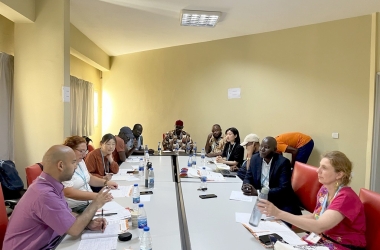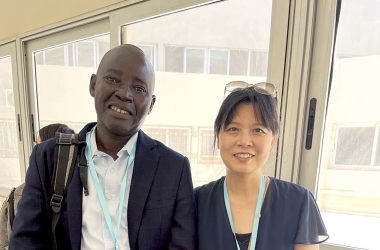Wittenborg Associate Professor Organises Programme on Global Health at Africa-Asia Conference

Cha-Hsuan Liu Leads Multidisciplinary Initiative Exploring Care, Connection and Humanity in a Cross-Cultural Context
To explore research connections between Africa and Asia and to network with fellow scholars, Wittenborg associate professor Cha-Hsuan Liu participated in the Africa-Asia International Conference-Festival (Confest), held from 11 to 14 June in Dakar, Senegal.
The event, which also celebrated global integration and local cultures, was organised by Senegal’s Cheikh Anta Diop University in collaboration with the Collective Africa-Southeast Asia Platform from Thailand and Leiden University’s International Institute for Asian Studies (IIAS). Comprising 12 thematic clusters, the Confest featured 136 activities including workshops, roundtables, panels and film exhibitions.
In total, over 500 people from around the world attended the event including participants from Senegal, Kenya, Morocco, Tanzania, South Africa, Japan, Taiwan, India, Indonesia, Brazil, Nigeria, Nepal, the Netherlands and other countries. One of the leading scholars who participated was Professor Moustapha Mbow of Cheikh Anta Diop University, who also serves as an advisor for World Health Organisation (WHO) vaccination programmes in Africa.
Liu was responsible for organising ‘Healing Through Humanity’, a five-part programme exploring themes of care, connection and collective healing. Among the activities was a presentation she delivered on the MBA thesis by Wittenborg graduate Tyler Sullivan, who analysed how to improve the performance of healthcare NGOs operating in conflict zones.
“Tyler’s thesis looks at how NGOs use their human and financial resources in different ways and situations. It tries to understand why some organisations manage to reach hundreds of thousands of people around the world, while others don’t. It’s a really relevant and timely topic that brings together healthcare and management,” the associate professor explained.

The programme also featured presentations of other studies, the roundtable Reimagine Medicine and Healing, a panel discussion, a workshop and a screening of the documentary ‘First Cry’, which tells the story of a mining community in India that built its own hospital.
Liu highlighted that the discussions were both multidisciplinary and multicultural, bringing together scholars from various fields and professionals from healthcare and other sectors across Africa, Asia, Europe, South America, the Middle East and beyond. She pointed out that the feedback on the programme was very positive, with participants drawing connections between research from different regions and emphasising the importance of human contact and mutual support across cultures.
“One of the main points of discussion was how Western medicine was imposed on other cultures in the past 200 years, and the impact these changes have had. Collective healing also involves cultural healing, which means recognising the value of traditional practices and integrating them into healthcare systems. We have to remember that modern medicine is actually the accumulated knowledge of thousands of years, and that knowledge needs to be organised and systematised.”
Liu added that the conference was organised by a network of scholars that has been built up over the years and now includes more than 50 members. She is currently exploring the possibility of starting research projects at Wittenborg connected to this initiative.
“The idea is to coordinate researchers from different parts of the world to develop a humanistic model that can be implemented in healthcare management. Wittenborg could really contribute to this project due to its expertise in business and management, and also because it’s the most diverse and international university of applied sciences in the Netherlands.”
WUP 04/08/2025
by Ulisses Sawczuk
©WUAS Press